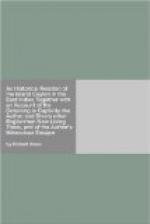[Their Weights.] For their Weights, their smallest is Collonda, six make just a Piece of eight. They have half Collondas and quarter Collondas. When they are to weigh things smaller than a Collonda, they weigh them with a kind of red Berries, which grow in the Woods, and are just like Beads. The Goldsmiths use them, Twenty of these Beads make a Collonda and Twenty Collondas make a Pallum.
[Measures bigger than the Statute punishable, but less not; and why.] Here is no Punishment for those that make less weights and measures. They are more circumspect that their measures be not too big than too little. For Money being scarce, Corn passeth instead of Money, and every man mets by his own measure. Which therefore he makes as large as he can or dares, that so when he receives his Debt of Corn, he may get as much as he can. Which upon this account would be a great injury to the poorer sort of People, who commonly are the Debtors. Therefore the Adigars Officers will go about the Towns to examine the measures by a Statute-Measure; and where they find great ones they cut them in pieces, and hang them up in the Streets to terrifie others, and sometimes will amerce a Fine upon them that have them.
[Of their Coin.] Of Money they have but three sorts that passeth for Coin in the King’s Dominions. The one was Coined by Portugals, the King’s Arms on one side, and the Image of a Frier on the other, and by the Chingulayes called Tangom massa. The value of one is nine pence English, Poddi Tangom, or the small Tangom is half as much. There is another sort, which all People by the King’s Permission may and do make. The shape is like a fish-hook, they stamp what mark or impression on it they please. The Silver is purely fine beyond pieces of Eight. For if any suspect the goodness of the Plate, it is the Custom to burn the Money in the fire red hot, and so put it in water: and if it be not then purely white, it is not Currant Money.
The third sort of Money is the King’s proper Coin. For none upon pain of Death may Coin it. It is called a Ponnam. It is as small as a Spangle: Seventy five make a piece of Eight, or a Spanish Dollar. But all sorts of Money is here very scarce: And they frequently buy and sell by exchanging Commodities.
[Of their Play.] Pass we now from their Business to their Pastimes and Diversions. They have but few Sports, neither do they delight in Play. Only at their New year, they will sport and be merry one with another. Their chief Play is to bowl Coker-nuts one against the other, to try which is the hardest. At this time none will work, until their Astrolagers tell them, it is a good hour to handle their Tools. And then both Men and Women do begin their proper works; the Man with his Ax, Bill, and Hough, and the Woman with her Broom, Pestle, and Fan to clean her Corn.




